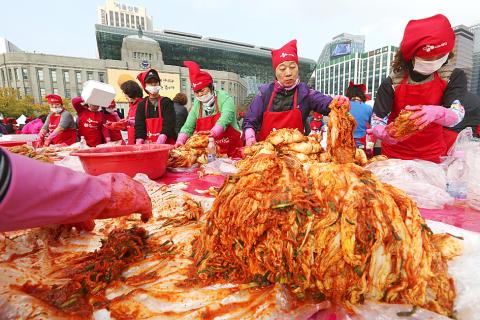South Korea’s trade deficit in kimchi, its proud traditional side dish of fermented cabbage, reached an all-time high last year as low-priced Chinese imports flooded the market, statistics showed yesterday.
The spicy foodstuff is emblematic of Korean cuisine and accompanies almost every meal served in the nation, whatever its culinary origins, with kimchi-making still an important annual ritual for many families.
However, the commercial market has been deluged by Chinese producers in recent years, resulting in what has been dubbed the “kimchi deficit.”

Photo: AP
South Korea imported more than 275,000 tonnes of kimchi last year, 99 percent of it from China, the Korea Customs Service (KCS) said, and exported just more than 24,000 tonnes.
The deficit stood at US$47.3 million by value, up 11 percent year-on-year and the largest since the KCS began tracking the data in 2000.
Price is a major factor in the trade, with imports costing just US$0.50 per kilogram in 2016, according to Korea Agro-Fisheries & Food Trade Corp, while exports — primarily destined for Japan — averaged US$3.36 per kilogram.
According to South Korea’s World Institute of Kimchi, 89.9 percent of the kimchi purchased by South Korean restaurants in 2016 was imported from China.
The kimchi trade first went into deficit in 2006, triggering soul-searching and a headline-grabbing scandal.
UNESCO inscribed South Korean kimchi on its intangible cultural heritage list in 2013, saying: “It forms an essential part of Korean meals, transcending class and regional differences.”
There are regional differences in the product, UNESCO said, and the specific methods and ingredients are considered an important family heritage, typically transmitted from a mother-in-law to her newly married daughter-in-law.

STEEP DECLINE: Yesterday’s drop was the third-steepest in its history, the steepest being Monday’s drop in the wake of the tariff announcement on Wednesday last week Taiwanese stocks continued their heavy sell-off yesterday, as concerns over US tariffs and unwinding of leveraged bets weighed on the market. The benchmark TAIEX plunged 1,068.19 points, or 5.79 percent, to 17,391.76, notching the biggest drop among Asian peers as it hit a 15-month low. The decline came even after the government on late Tuesday authorized the NT$500 billion (US$15.2 billion) National Stabilization Fund (國安基金) to step in to buoy the market amid investors’ worries over tariffs imposed by US President Donald Trump. Yesterday’s decline was the third-steepest in its history, trailing only the declines of 2,065.87 points on Monday and

TAKING STOCK: A Taiwanese cookware firm in Vietnam urged customers to assess inventory or place orders early so shipments can reach the US while tariffs are paused Taiwanese businesses in Vietnam are exploring alternatives after the White House imposed a 46 percent import duty on Vietnamese goods, following US President Donald Trump’s announcement of “reciprocal” tariffs on the US’ trading partners. Lo Shih-liang (羅世良), chairman of Brico Industry Co (裕茂工業), a Taiwanese company that manufactures cast iron cookware and stove components in Vietnam, said that more than 40 percent of his business was tied to the US market, describing the constant US policy shifts as an emotional roller coaster. “I work during the day and stay up all night watching the news. I’ve been following US news until 3am

Six years ago, LVMH’s billionaire CEO Bernard Arnault and US President Donald Trump cut the blue ribbon on a factory in rural Texas that would make designer handbags for Louis Vuitton, one of the world’s best-known luxury brands. However, since the high-profile opening, the factory has faced a host of problems limiting production, 11 former Louis Vuitton employees said. The site has consistently ranked among the worst-performing for Louis Vuitton globally, “significantly” underperforming other facilities, said three former Louis Vuitton workers and a senior industry source, who cited internal rankings shared with staff. The plant’s problems — which have not

TARIFF CONCERNS: The chipmaker cited global uncertainty from US tariffs and a weakening economic outlook, but said its Singapore expansion remains on track Vanguard International Semiconductor Corp (世界先進), a foundry service provider specializing in producing power management and display driver chips, yesterday withdrew its full-year revenue projection of moderate growth for this year, as escalating US tariff tensions raised uncertainty and concern about a potential economic recession. The Hsinchu-based chipmaker in February said revenues this year would grow mildly from last year based on improving supply chain inventory levels and market demand. At the time, it also anticipated gradual quarter revenue growth. However, the US’ sweeping tariff policy has upended the industry’s supply chains and weakened economic prospects for the world economy, it said. “Now